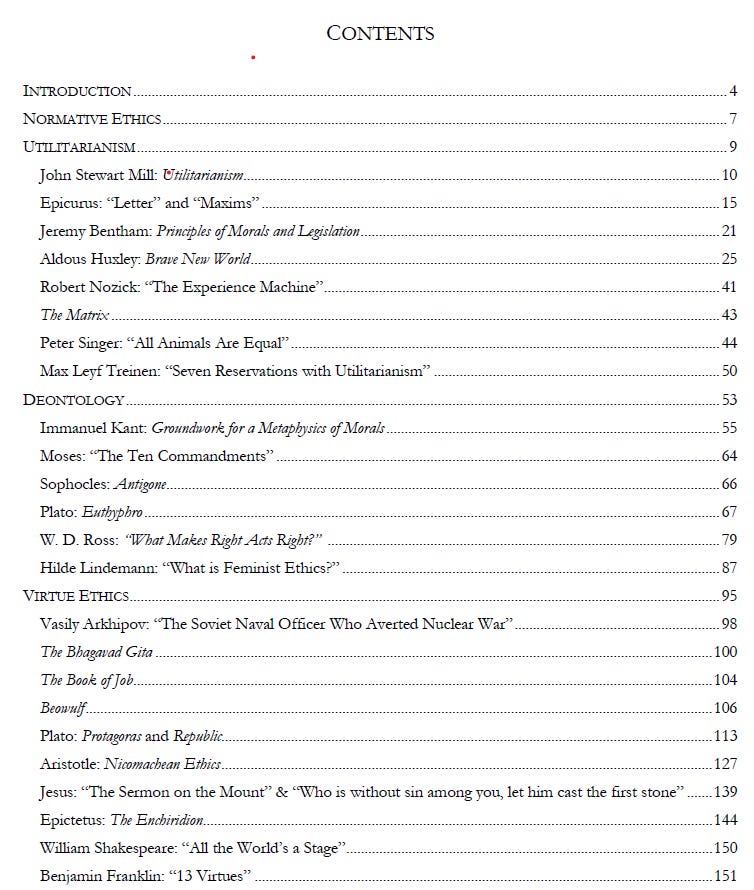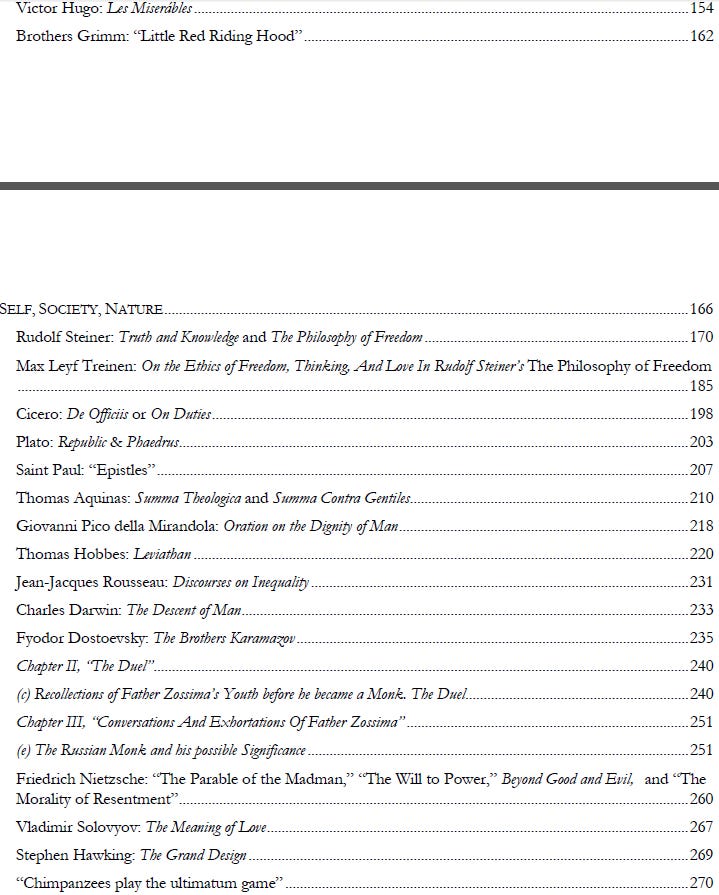After having taught an Ethics course at Alaska Pacific University for a number of years, and now at the University of Alaska Anchorage as well, I have found myself sufficiently dissatisfied with the commonly available textbooks and ethics readers to write my own. Whether it will end up as anything more than a personal reference and teaching tool is neither here nor there because my purpose in composing it is my conviction that it will serve the education of my students and I have already been employing it to that effect for two years now. Anyone with interest is welcome to request the whole compilation as a PDF, for which I have included the table of contents below. A general introduction to the subject of ethics will be the topic of this essay, followed by introductions to several schools of thought.
Utilitarianism is the best known species within the genus of consequentialist theories of normative ethics. In other words, utilitarianism is one form of consequentialism. Consequentialism, in turn, is often employed as a synonym for teleology within the context of normative ethics. While there is some relation between these terms, I think that it is a mistake to use them interchangeably. The reason I think that a distinction ought to be maintained between consequentialism and teleology in ethics is that consequentialism evaluates given actions according to their specific outcomes or “consequences”—most often quantified in terms of utility, or “usefulness.” Following Jeremy Bentham’s articulation of the utilitarian doctrine in 1780, utility is most often interpreted to mean “happiness,” “pleasure,” or “absence of pain.” Since these affective states represent the outcome of a given action and since, in keeping with the consequentialist outlook on ethics, the moral worth of an action is measured precisely by its ability to evoke these affective states following its perpetration, consequentialism is, strictly speaking, not synonymous with teleology. Consequentialism measures an action by its outcome alone, in abstraction from everything else including the means by which the outcome was achieved. Teleological ethics, by contrast, centers not on the outcome alone but on the tendency toward, or process of achieving, that outcome. Incidentally, this is the reason that virtue ethics, which will be the subject of Part III, can be classed amongst teleological, but not consequentialist ethics. Virtue ethics, with its emphasis on the development of virtuous traits of character, is teleological in that the development is toward some end. However, virtue ethics is not consequentialist in that no end is specified that is external to the very virtues that bear one towards that end. Put another way, consequentialism prescinds the product of a deed from the process of its completion while teleological ethics maintains the integrity of these elements.
In contrast to virtue ethics, which is teleological but not consequentialist, utilitarianism (which is the subject of this section) falls squarely within the genus of consequentialism. John Stewart Mill (1806-1873) describes the doctrine of utilitarianism as follows in his seminal work on the subject written in 1863:
The creed which accepts as the foundation of morals, Utility, or the Greatest Happiness Principle, holds that actions are right in proportion as they tend to promote happiness, wrong as they tend to produce the reverse of happiness. By happiness is intended pleasure, and the absence of pain; by unhappiness, pain, and the privation of pleasure.
I have chosen a selection from Mill’s treatise Utilitarianism, which begins with the statement quoted above, to serve as the representative text for the section on utilitarian ethics. I have followed it with a diachronic survey of other key texts on the subject, both preceding and following the publication of Mill’s major work. The first is a selection from the ancient Greek thinker Epicurus, who is often hailed as the father of hedonism, or the doctrine that pleasure is the measure of existence. Then follows a selection from Jeremy Bentham, written some twenty-one centuries after Epicurus. Bentham was Mill’s forebear and tutor, and is largely hailed as the founder of the modern formulation of the doctrine of utilitarianism, which Mill built upon and strove to perfect.
Next follow three criticisms of utilitarianism. The first is an excerpt from Aldous Huxley’s 1932 classic dystopian novel Brave New World. This is followed by the philosopher Robert Nozick’s famous thought experiment from his 1974 work Anarchy, State, Utopia in which he presents a thought experiment meant to illuminate the difference between pleasure and value, which the doctrine of utilitarianism equates. Nozick’s thought experiment may be familiar to contemporary readers from the Wachowski Brothers’ epochal film, The Matrix (1999), and in fact, I have included a transcript from a short scene in the film in which a character gives his reason for opting to re-enter “the matrix,” which is the film’s version of Nozick’s “experience machine.” Strictly speaking, this selection does not follow the chronological sequence that is the rule for the other selections after Mill’s keynote one, but it is thematically so tightly-coupled with the piece that precedes it that I thought it justified making an exception to the order. Next in order is J. J. C. Smart’ 1956 essay “Extreme and Restricted Utilitarianism,” in which he presents two forms of utilitarianism, which today are known under the rubrics of act and rule utilitarianism, respectively. Smart argues, in the spirit of Mill and Bentham, for the former, more categorical form of utilitarianism. Finally, I have written a short article enumerating seven reservations a person might have with accepting utilitarianism as a viable moral theory.
On a prior occasion sub umbra coronæ, which is, “under the shadow of the Crown,” I have recorded these lectures which are also pertinent to the theme of this piece.





It's my duty as a former Latin teacher to inform you that 'beneath the shadow of the crown' would be 'sub umbra coronae' rather than coronam.